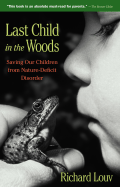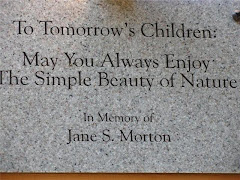The book, first published in 2005 and now reaching the international market, has provided  food for thought in support of more ecological education. The book is aimed at parents, teachers, city planners, architects, politicians and business owners. Louv argues that the bond between children and nature has been severed.
food for thought in support of more ecological education. The book is aimed at parents, teachers, city planners, architects, politicians and business owners. Louv argues that the bond between children and nature has been severed.
He subtitled the book Saving Our Children From Nature Deficit Disorder, arguing that a number of physical and mental problems that children have are rooted in their lack of contact with nature. Louv used studies and conducted interviews with educators and scientists to reach his conclusions. He links the high number of overweight children in the US and the frequency
Direct contact with the wilderness and its abundance strengthens a child's self-esteem, his personality and his learning aptitudes such as reading ability. According to the author, only people who have strong contact with nature from an early age can be respectful and protective of it as adults.
Based on his own experience, Louv has placed the bar high. He recommends children build tree houses, stay in cabins and find ways to observe wild animals in their environment. These ideas are hard to fulfill in a city, but the author suggest a number of possibilities for city children to have contact with nature. For little children, a few trees make up a forest and a puddle can offer a window into a natural habitat. Lift a stone to find the ground teeming with bugs or observe the life of squirrels in city parks, Louv suggests. He also recommends that parents have their children work in the garden, go on hikes to places that are seldom visited or go on hikes at night. Children should have fun discovering nature and allow themselves to be amazed by it and respect it.
 |
| Click to learn more! |
Related Posts: Nature Deficit Disorder and Wildlife Friendly Yards Backyard Nature Kits for Kids! Create a Simple Butterfly Garden
From Jeanne Hamming of Scientific American Magazine: "Unstructured outdoor play was standard for me as a hyperactive child growing up in the rural Midwest. I fondly recall digging forts, climbing trees and catching frogs without concern for kidnappers or West Nile virus. According to newspaper columnist and child advocate Richard Louv, such carefree days are gone for America’s youth. Boys and girls now live a "denatured childhood," Louv writes in Last Child in the Woods. He cites multiple causes for why children spend less time outdoors and why they have less access to nature: our growing addiction to electronic media, the relinquishment of green spaces to development, parents’ exaggerated fears of natural and human predators, and the threat of lawsuits and vandalism that has prompted community officials to forbid access to their land. Drawing on personal experience and the perspectives of urban planners, educators, naturalists and psychologists, Louv links children’s alienation from nature to attention-deficit hyperactivity disorder, stress, depression and anxiety disorders, not to mention childhood obesity. The connections seem tenuous at times, but it is hard not to agree with him based on the acres of anecdotal evidence that he presents. According to Louv, the replacement of open meadows, woods and wetlands by manicured lawns, golf courses and housing developments has led children away from the natural world. What little time they spend outside is on designer playgrounds or fenced yards and is structured, safe and isolating. Such antiseptic spaces provide little opportunity for exploration, imagination or peaceful contemplation. Louv’s idea is not new.
 |
| Click to learn more! |
Robert Morton, M.Ed., Ed.S believes urban sprawl can be offset by creating wildlife-friendly spaces in America's 25,000,000 lawns, one yard at a time! Click HERE to learn why. A portion of Ad sale revenues will be donated to Monarch Watch. Do you have a wildlife-friendly space? Please share it! Contact us on the secure Bpath Mail Form.
